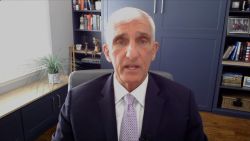The cracks in the relationship between South Korea and Japan are deepening – undercutting security cooperation on North Korea and potentially handing a win to China.
South Korea announced Thursday it would abandon a military intelligence sharing agreement with Japan in the next few months as part of an increasingly vicious trade war that is mired in historical animosity.
But the decision to leave the agreement is a significant blow to the United States-led military alliance, that for decades has helped broker peace in Northeast Asia, while pushing back against increasing Chinese influence.
Experts say the situation is yet another example of how President Donald Trump’s disinterest in longstanding alliances has provided an opening for Washington’s adversaries to degrade those relationships. The same criticism was leveled earlier this year, when Seoul and Tokyo were fighting over a series of military confrontations.
China and North Korea have long sought to reduce the US military presence in Northeast Asia by throwing wrenches in the trilateral relationship between Washington, Seoul and Tokyo.
The weakest link in that triangle is between Seoul and Tokyo, who deeply mistrust one another due to the legacy of Japan’s colonization of Korea. Critics of the Trump administration’s northeast Asia policy have accused the President of ignoring Washington’s traditional role in mediating between South Korea and Japan.
“The United States is a common point between the two bilateral alliances and it’s far less efficient in the movement of information in either direction,” said retired Gen. Vincent Brooks, who used to command US-South Korea Combined Forces.
What this does
Practically speaking, abandoning the intelligence sharing agreement will slow things down.
Let’s say North Korea test-fires another short range missile, something they’ve done with increasing frequency this summer. The data South Korean intelligence can glean from that test, like how far, fast and high the missile goes, can reveal important details about the weapon’s sophistication. Those conclusions can help Tokyo, Seoul and Washington better adapt missile defense systems to prepare for the worst.
The agreement allowed the two sides to “seamlessly share military intelligence,” but as it stands currently, the US will be forced to play the role of middle man, said Abraham Denmark, a former US deputy assistant secretary for defense for East Asia.
“This slows down decision-making, which is frustrating day-to-day but could have serious implications in a fast-moving crisis.”
It’s also likely to embolden China, an aspiring regional power which claims islands administered by Japan, and has pushed back at South Korea over its deployment of the US made THAAD missile defense shield.
The recent advancement of the Chinese military has alarmed US defense chiefs, who in a report earlier warned that Beijing was intent on becoming “the preeminent power in the Indo-Pacific.”
Since 2014, China has launched more submarines, warships, principal amphibious vessels and auxiliaries than the total number of ships currently serving in the navies of Germany, India, Spain, Taiwan and the United Kingdom, according to a 2018 report by think tank IISS.
The Chinese air force has also been regularly debuting new and improved planes and weapons, including the twin-engine J-20 stealth fighter.
Beijing’s air force is now the largest in Asia and the third largest in the world, according to the US Defense Department, and is closing the gap with the US “across a spectrum of capabilities.”
To counter that ambition, the US needs to increase cooperation with, and between Asian defense partners. In a statement Friday, Japanese Defense Minister Takeshi Iwaya said that South Korea’s move shows a “misunderstanding” of the current security situation in the region.
“It is extremely regrettable and disappointing,” Iwaya said.
US Secretary of State Mike Pompeo, meanwhile, said he was “disappointed” by Seoul’s decision to leave the agreement, adding that he hopes “those two countries can begin to put that relationship back in exactly the right place.”
What this means
Though the only two liberal democracies in the region, Seoul and Tokyo are essentially friends of convenience thanks to each country’s treaty alliance with the US. They’re historic adversaries, and the legacy of Japan’s colonization of the Korean Peninsula in the first half of the 20th century looms large. Under Japanese rule, many Koreans were brutalized, murdered and enslaved. It’s still living memory for elderly Koreans and remains a highly emotive subject in both North and South Korea.
South Korea and Japan signed a treaty in 1965 that normalized relations between the two countries and was supposed to settle lingering wartime issues.
But South Korea was a military dictatorship at the time, and many Koreans felt the deal was unfair.
Today, the two countries remain locked in heated debate over statues depicting “comfort women” – Korean women forced into providing sexual services for Japanese soldiers – and decisions by South Korea’s Supreme Court allowing citizens to sue Japanese corporations for reparations for forced labor.
Japan contends both issues were settled by the treaty.
But despite the historic animosity, the military relationship between the two countries has been largely unaffected. It was Washington’s traditional job to bring both sides to the table, hash out problems and sell them on the advantages of unity in facing threats from Pyongyang or Beijing.
President Donald Trump, however, has seemed to eschew this role. He’s publicly questioned the value of investing so much American money in the alliance networks in the region, and is pushing for both South Korea and Japan to invest more in their military partnership with the US.
The military spat is now coming to the fore because the Trump administration has not invested proper time or showed it cares as much about alliance maintenance as his predecessors did, said Van Jackson, a former Defense Department official in the Obama administration specializing in northeast Asian Affairs.
“This could have happened at any prior time in the last 20 years, and the only reason it didn’t was because of people at the mid-level and political appointees in the US who spent significant amounts of time and political capital to try to improve this combustibility,” he said.
Experts say that US adversaries like North Korea, China and even Russia likely sense an opening. Pyongyang and Beijing have long sought to drive a wedge in the relationships between all three countries in order to push their own goals.
“This is a boon for those that would like to see US power in Asia diminished and its alliances weakened – specifically, China and North Korea,” said Denmark, now the director of the Asia program at the Woodrow Wilson International Center for Scholars.
“Both see the United States as their primary adversary and US alliances as a major impediment to their strategic objectives. Problems between US alliances – especially those as critical as Japan and South Korea – is seen as both a challenge for American strategy but also a symbol of diminishing American power in Asia.”
CNN’s David Culver, Yoonjung Seo and Ben Westcott contributed reporting



















